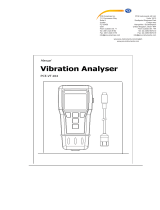Page is loading ...

User's Guide
Pen Vibration Meter
Model VB400

VB400-en-GB_v1.2 11/15
2
Introduction
Congratulations on your purchase of the Extech VB400 Meter. The VB400 is designed to provide
easy and accurate velocity and acceleration measurements on industrial machinery. This meter is
shipped fully tested and calibrated and, with proper use, will provide years of reliable service.
Features
Applications for industrial vibration monitoring :
All in one pen type digital vibration meter.
Acceleration, Velocity measurement, RMS measurement value.
Metric & Imperial display unit
Frequency range 10 Hz - 1 kHz, sensitivity designed to meet ISO 2954.
High accuracy and easy to read LCD display.
Complete with the test pin and magnetic base.
Low battery indicator.
IP65 protection.
Safety
This symbol, adjacent to another symbol or terminal, indicates the user must refer to the
manual for further information.

VB400-en-GB_v1.2 11/15
3
Meter Description
1. Display
2. Power Button
3. Hold Button
4. Function Button
5. Battery Cover/Compartment
6. Vibration Sensor
7. Tip Sensing Head
8. Magnetic Base
Display Icons
HOLD HOLD has been activated
ACC Acceleration with units : m/s
2
, ft/s
2
, g
VEL Velocity with units: mm/s, cm /s, inch/s
Low battery
Magnetic base and Tip sensing head
When measuring non-ferrous materials, place the Tip sensing head onto the vibration sensor.
Unscrew the magnetic base from the sensor and screw on the Tip.
When measuring a ferrous surface, place the magnetic base onto the vibration sensor.
Unscrew the tip from the sensor and screw on the magnetic base.
1
2
3
4
5
6
7
8

VB400-en-GB_v1.2 11/15
4
Operation
Preparation for measurements
1. Press the POWER button to turn the meter on.
2. Check that the display is on and that the low battery icon is not on.
3. If the low battery icon appears, replace the batteries.
4. Attach either the sensing head or the magnetic base by screwing it into the vibration sensor.
Measurements
1. Press the MODE button to step through and set the function (velocity or acceleration) and the
units desired.
2. For non-ferrous surfaces, gently hold the meter (as shown) with the sensing tip against the
vibrating surface.
3. For ferrous surfaces, attach the meter to the surface with the magnetic base.
4. The meter must be held perpendicular to the surface to maintain measurement
accuracy
5. Read the measured value in the display.
Data Hold
1. Press the HOLD button to freeze the display and hold the measured value.
2. Press the HOLD button again to exit and return to normal operation

VB400-en-GB_v1.2 11/15
5
Zero Adjustment Procedure
Over time the meter ‘0” may drift by a few digits. This is caused by temperature change, battery
voltage and other ageing factors. Usually this small change is not of significance for typical
measurements. To remove the error:
1. Open the battery compartment
2. Hold the battery lid down so contact is made and the meter can be turned on.
3. With no vibration, adjust the meter zero adjustment until the display reads zero (no minus
sign).
Battery lid (1) and Zero adjustment (2)
Battery Replacement
1 Unscrew the meter’s top cover
2 Lift the battery lid and replace the four AAA batteries, observing polarity
3 Replace the cover.
ISO Vibration Severity Guidelines
ISO 10816 Standards provide guidance for evaluating vibration severity in machines operating in
the 10 to 200Hz (600 to 12,000 RPM) frequency range. Examples of these types of machines are
small, direct-coupled, electric motors and pumps, production motors, medium motors, generators,
steam and gas turbines, turbo-compressors, turbo-pumps and fans. The axis of the rotating shaft
may be horizontal, vertical or inclined at any angle.
1
2

VB400-en-GB_v1.2 11/15
6
Specifications
General Specifications
Display LCD, 20 mm x 28 mm.
Measurement Velocity, Acceleration.
(RMS value).
Mode Acceleration:
g, m/s
2,
ft/s
2
Velocity: mm/s, cm/s, inch/s
Frequency range 10 Hz to 1 KHz
Sampling time Approx. 1 second.
Operating temperature 0 to 50°
C
( 32 to 122°
F
).
Operating humidity < 80% RH.
Power supply DC 1.5V battery ( UM-4/AAA ) x 4 PCs.
Power consumption Approx. DC 12 mA.
Weight 240 g ( 0.53 lb ).
Dimension Meter: 175 x 40 x 32 mm, ( 6.9 x 1.6 x 1.3 inch ).
Sensing head: Round 9 mm Dia. x 30 mm.
Accuracy Specifications
Mode Range Resolution Accuracy
Acceleration 0.5 to 199.9m/s
2
0.1
±(5%rdg+2digits)
@160Hz, 80Hz, 23±5°C
0.05 to 20.39g 0.01
2 to 656ft/s
2
1
Calibration point: 50m/s
2
(160Hz)
Velocity
0.5 to 199.9 mm/s
0.1mm/s
±(5%rdg+2digits)
@160Hz, 80Hz, 23±5°C
0.05 to 19.99 cm/s
0.01
0.02 to 7.87inch/s
0.01inch/s
Calibration point: 50mm/s (160Hz)
Copyright © 2014-2015 FLIR Systems, Inc.
All rights reserved including the right of reproduction in whole or in part in any form.
www.extech.com
/





